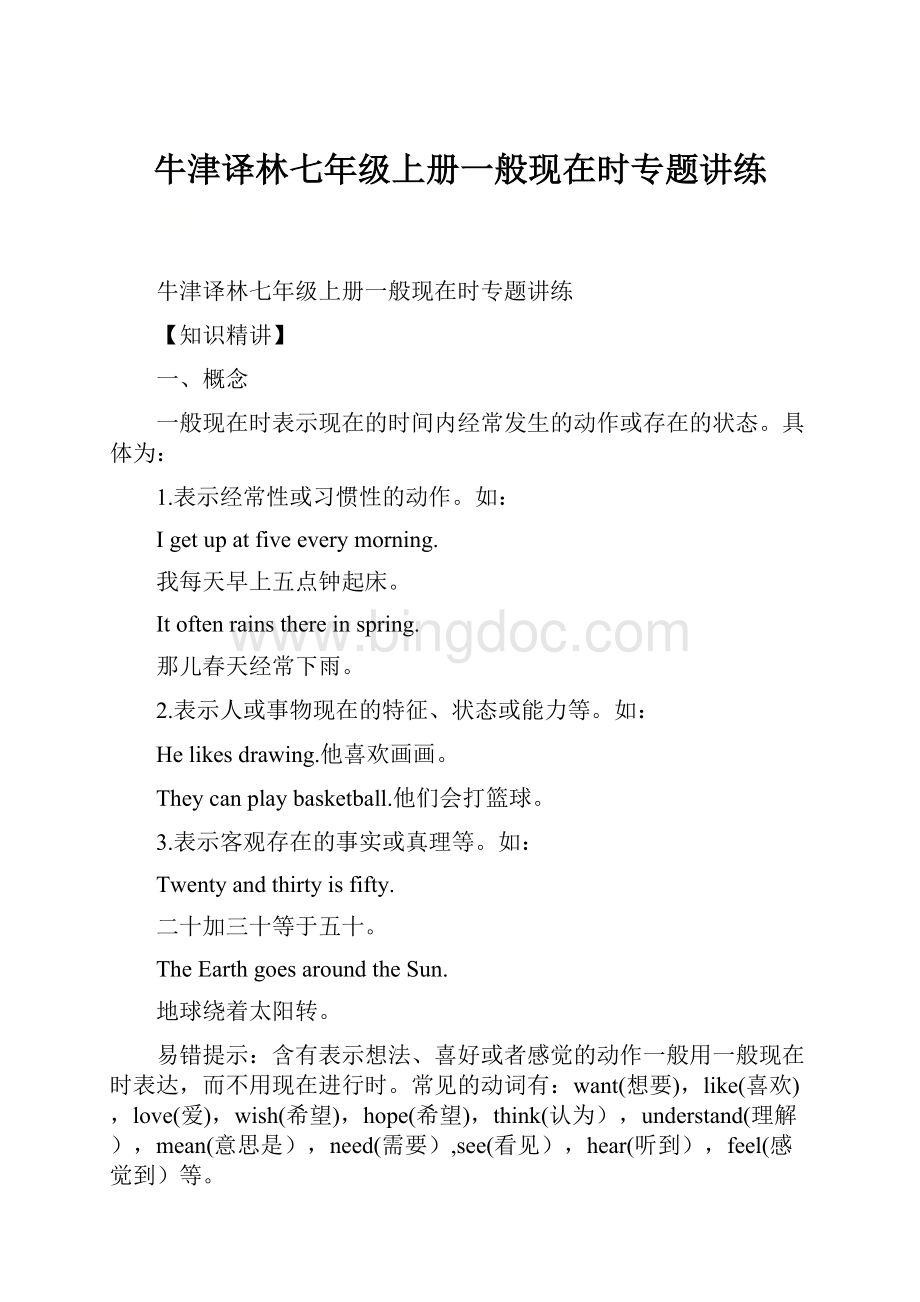牛津译林七年级上册一般现在时专题讲练.docx
《牛津译林七年级上册一般现在时专题讲练.docx》由会员分享,可在线阅读,更多相关《牛津译林七年级上册一般现在时专题讲练.docx(9页珍藏版)》请在冰点文库上搜索。

牛津译林七年级上册一般现在时专题讲练
牛津译林七年级上册一般现在时专题讲练
【知识精讲】
一、概念
一般现在时表示现在的时间内经常发生的动作或存在的状态。
具体为:
1.表示经常性或习惯性的动作。
如:
Igetupatfiveeverymorning.
我每天早上五点钟起床。
Itoftenrainsthereinspring.
那儿春天经常下雨。
2.表示人或事物现在的特征、状态或能力等。
如:
Helikesdrawing.他喜欢画画。
Theycanplaybasketball.他们会打篮球。
3.表示客观存在的事实或真理等。
如:
Twentyandthirtyisfifty.
二十加三十等于五十。
TheEarthgoesaroundtheSun.
地球绕着太阳转。
易错提示:
含有表示想法、喜好或者感觉的动作一般用一般现在时表达,而不用现在进行时。
常见的动词有:
want(想要),like(喜欢),love(爱),wish(希望),hope(希望),think(认为),understand(理解),mean(意思是),need(需要),see(看见),hear(听到),feel(感觉到)等。
真题解析
()-----Whatdoesyourfatherdobeforebedtimeeveryday?
-----He.
A.watchTVB.readsnewspapersC.willbrushhisteeth
解析:
答句与问句时态保持一致,都用一般现在时。
答案:
B
小试身手
用所给词的适当形式填空。
Mikealways(finish)hishomeworkbeforedinnerand(go)tobedearly.
答案:
finishes;goes
二、基本结构
1.一般现在时的肯定句的基本结构
(1)be动词:
主语+is/am/are+其他。
如:
Heisacleverboy.他是个聪明的男孩。
WearefromAustralia.我们来自澳大利亚。
(2)行为动词:
主语十行为动词(+其他)。
如:
Ihavebreakfastatseveno'clockinthemorning.
我早上七点钟吃早饭。
Theyhelpkeeptheairclean.
它们帮助保持空气干净。
(3)当主语为第三人称单数时,其谓语动词也要变成对应的第三人称单数形式。
如:
Nancylikessinginganddancing.
南希喜欢唱歌和跳舞。
SuHaieatsaneggeveryday.
苏海每天吃一个鸡蛋。
在一般现在时的肯定句的基本结构中,应注意不同人称be动词或实义动词的正确使用。
如下表:
实义动词
be动词
Ilikeit.
Iamastudent.
Youlikeit.
Youareastudent.
He/Shelikesit.
He/Sheisastudent.
We/You/Theylikeit.
We/You/Theyarestudents.
真题解析
()LiuTaoaheadache.Heverysad.
A.has;isB.haves;feelC.have;feels
解析:
LiuTao为第三人称单数,谓语动词也用第三人称单数形式。
答案:
A
小试身手
根据中文意思,完成句子。
我从不晚睡觉。
Ineverbed
答案:
goto;late
2.一般现在时的否定句的基本结构
一般现在时的否定句一般在实义动词前加助动词do(es)not,后跟实义动词原形;或在be动词后面加not。
如下表:
实义动词
be动词
I/You/We/Theydonotlikeit.
Iamnotastudent.
Youarenotastudent.
We/You/Theyarenotstudents.
He/Sheisnotastudent.
He/Shedoesnotlikeit.
真题解析
用所给词的适当形式填空。
SuHaiandSuYang(notfly)kitesatweekends.
解析:
SuHaiandSuYang为复数,故用don't,后跟原形fly。
答案:
don'tfly
小试身手
改为否定句。
WangBingdoeswellinplayingtabletennis.
WangBinginplayingtabletennis.
答案:
doesn’tdowell
3.一般现在时的一般疑问句的基本结构
一般现在时的一般疑问句一般在句首加助动词do或does,后跟动词原形;be动词只需要与主语位置对调,句末用问号。
如下表:
实义动词
be动词
Doyou/theylikeit?
Areyou/theystudents?
Areyouastudent?
Doeshe/shelikeit?
Ishe/sheastudent?
真题解析
改为一般疑问句,并作肯定回答。
I'mexcitedabouttheAustralianfootballgame.
-----youtheAustralianfootballgame?
-----,I
解析:
含be动词的陈述句改为一般疑问句,只需要be动词与主语位置对调,句末用问号。
答案:
Are;excitedabout;Yes;am
小试身手
①所给词的适当形式填空。
you(have)ane-friend,MissLi?
②根据中文意思,完成句子。
“你妈妈总是开车上班吗?
”
“不是。
”
-----yourmotheralwaysworkcar?
-----,she
答案:
Dohave;
Does;goto;by;No;doesn’t
4.一般现在时的特殊疑问句的基本结构
一般现在时的特殊疑问句由“疑问词+一般疑问句?
”构成。
如:
Shecomestoschoolonfoot.
→Howdoesshecometoschool?
方法归纳:
实义动词的一般现在时用法
用好一般现在时,时间状语须牢记。
基本用法要记清,动作习惯经常性。
谓语若为实义动,形式要由主语定。
主语人称是三单,动词要把-s/-es加。
句中若把助词用,谓语动词用原形。
真题解析
对画线部分提问
Manychildrenwanttobepolicemeninthefuture.
manychildrentobeinthefuture?
解析:
对职业提问用what.
答案:
Whatdo;want
小试身手
①用所给词的适当形式填空。
Who(teach)youMusicthisterm?
②根据中文意思,完成句子。
“刘涛在周末通常做什么?
”
“他通常和朋友们看电影。
”
-----LiuTaousuallyatweekends?
-----Heusuallywithhisfriends.
答案:
teaches
Whatdoes;do;watchesfilms
【随堂小练】
一、按要求写句子。
1.GrandpaWanglivesinShanghai.(对画线部分提问)
2.Theyhaveapicnicinthepark.(改为一般疑问句)
3.Johnlikesgreenplanes.(对画线部分提问)
4.Amygoestoworkonfoot.(对画线部分提问)
5.Theboyplaystheviolineveryevening.(改为否定句)
6.DoesBob'sauntlikedancing?
(做肯定回答)
7.Sheisateacher.Shegoestoschoolbybus.(用they替换she改写句子)
答案:
1.WheredoesGrandpaWanglive?
2.Dotheyhaveapicnicinthepark?
3.WhatdoesJohnlike?
4.HowdoesAmygotowork?
5.Theboydoesn’tplaytheviolineveryevening
6.Yes,shedoes
7.Theyareteachers.Theygotoschoolbybus
二、单项选择。
()1.-----sheateacher?
-----Yes,she
A.Is;isB.Does;isC.Is;does
()2.-----WheredoesMrGreen
-----HeintheUK.
A.live;livesB.lived;liveC.lives;live
()3.Tracyastudent.Iadoctor.Theynurses.
A.are;am;areB.is;are;amC.is;am;are
()4.-----Whathelike?
-----Hemusic.
A.does;likesB.does;likeC.do;like
()5.Hedoesn'thishomeworkintheafternoon.
A.doingB.todoC.do
()6.-----Atheyuniversitystudents?
-----No,they
A.Is;isn'tB.Are;areC.Are;aren't
()7.-----Jackgototheswimmingpoolonceaweek?
-----Yes,he
A.Does;doB.Do;doC.Does;does
()8.Thesunintheevening.
A.godownB.goingdownC.goesdown
()9.TomabicycleonSundays.
A.rideB.ridesC.rode
答案:
AACACCCCB
三、用所给单词的正确形式填空。
1.you(wash)yourclotheseverymorning?
2.Lucyusually(get)uplateontheweekendand(watch)TVintheafternoon.
3.Harry(go)toworkat8:
00everymorning.
4.Everyone(say)sheisagoodgirl.
5.Susan(do)somelisteningpracticeintheeveningeveryday.
6.MrSmith(go)toworkbycar?
7.Theman(teach)usscienceonSaturdays.
8.Whichone(do)youlike?
9.TracyandLinda(be)inGroup2,Class4.
10.Youalways(sing)well.
答案:
Do;wash;gets;watches;goes;says;does;Does;go;teaches;do;are;sing
四、改错。
圈出句中的一处错误,并改正在横线上。
1.Isshelikegoingfishing?
2.WhatcanIdoesforyou?
3.MyunclestudyesEnglishveryhard.
4.MrLidon'thaveanyapples.
5.DoLilygotoworkbybus?
6.Wheredoshego?
7.Howdoesthemicefeelaboutthecat?
8.Doessheplaysthepianoverywell?
9.Theybothlikesapplejuice.
10.Theearthmovearoundthesun.
答案:
Is改为Does;does改为do;studyes改为studies;don’t改为doesn’t;Do改为Does;do改为Does;
do改为Does;play改为plays;likes改为like;move改为moves